Analysis of Job Dissatisfaction Impact on UK Organizations
VerifiedAdded on 2022/11/23
|8
|2490
|132
Report
AI Summary
This report addresses the issue of job dissatisfaction among UK workers, highlighting its impact on organizational performance. It explores the nature of the problem, analyzing its effects such as lower morale, false work, and decreased competitiveness. The report delves into the causes of dissatisfaction, including long working hours, poor workplace relationships, and lack of growth opportunities, supported by a cause-and-effect analysis. A PESTLE analysis is conducted to examine the macro-environmental factors contributing to the problem. The report proposes several solutions, including motivation, personalization, appraisals, and a flexible work culture. Finally, it outlines a plan for implementing decisions, incorporating decision-making frameworks, ranking priorities, quantifying approaches, and pruning unproductive projects to improve job satisfaction and overall organizational performance.

Problem solving
and decision
making
and decision
making
Paraphrase This Document
Need a fresh take? Get an instant paraphrase of this document with our AI Paraphraser
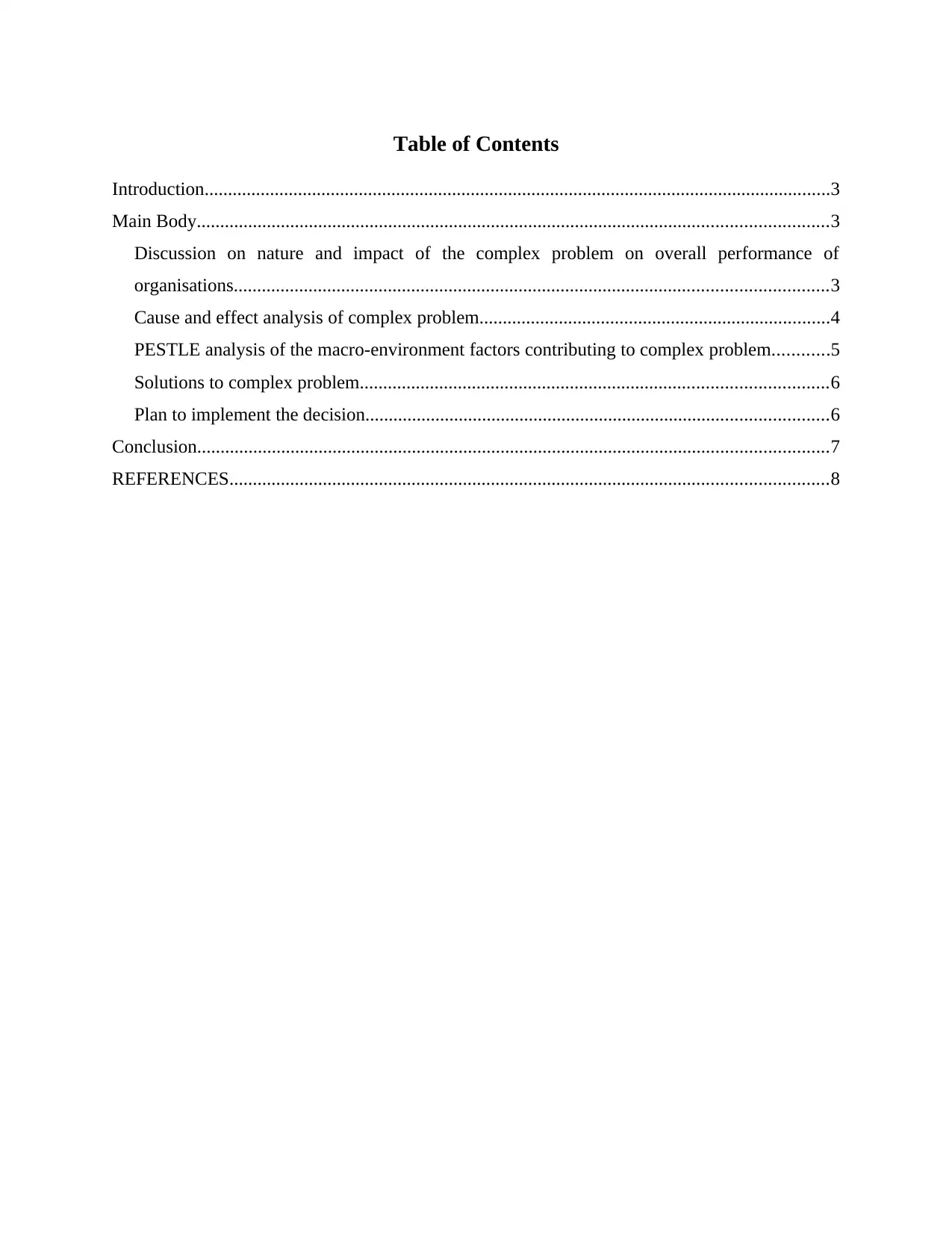
Table of Contents
Introduction......................................................................................................................................3
Main Body.......................................................................................................................................3
Discussion on nature and impact of the complex problem on overall performance of
organisations...............................................................................................................................3
Cause and effect analysis of complex problem...........................................................................4
PESTLE analysis of the macro-environment factors contributing to complex problem............5
Solutions to complex problem....................................................................................................6
Plan to implement the decision...................................................................................................6
Conclusion.......................................................................................................................................7
REFERENCES................................................................................................................................8
Introduction......................................................................................................................................3
Main Body.......................................................................................................................................3
Discussion on nature and impact of the complex problem on overall performance of
organisations...............................................................................................................................3
Cause and effect analysis of complex problem...........................................................................4
PESTLE analysis of the macro-environment factors contributing to complex problem............5
Solutions to complex problem....................................................................................................6
Plan to implement the decision...................................................................................................6
Conclusion.......................................................................................................................................7
REFERENCES................................................................................................................................8
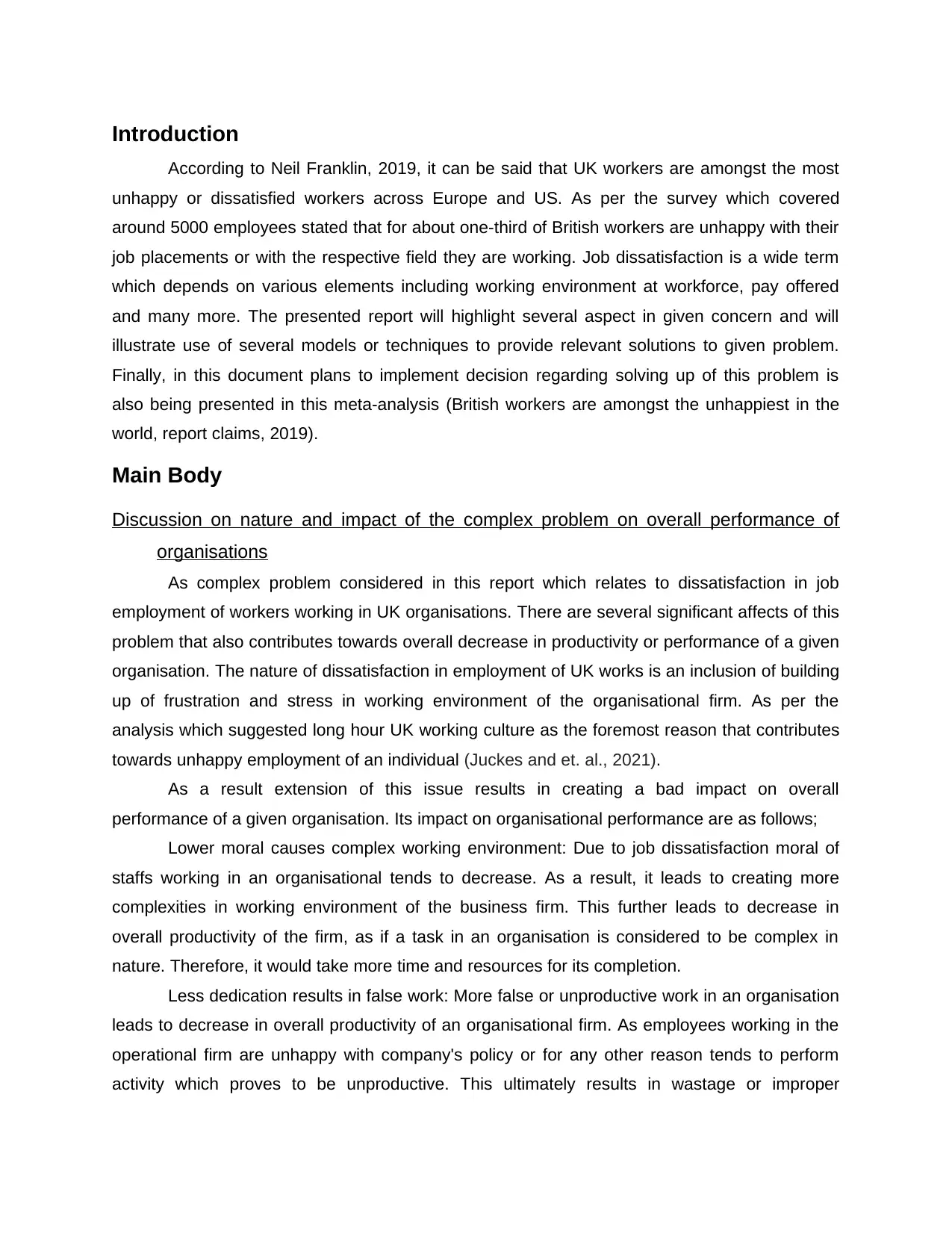
Introduction
According to Neil Franklin, 2019, it can be said that UK workers are amongst the most
unhappy or dissatisfied workers across Europe and US. As per the survey which covered
around 5000 employees stated that for about one-third of British workers are unhappy with their
job placements or with the respective field they are working. Job dissatisfaction is a wide term
which depends on various elements including working environment at workforce, pay offered
and many more. The presented report will highlight several aspect in given concern and will
illustrate use of several models or techniques to provide relevant solutions to given problem.
Finally, in this document plans to implement decision regarding solving up of this problem is
also being presented in this meta-analysis (British workers are amongst the unhappiest in the
world, report claims, 2019).
Main Body
Discussion on nature and impact of the complex problem on overall performance of
organisations
As complex problem considered in this report which relates to dissatisfaction in job
employment of workers working in UK organisations. There are several significant affects of this
problem that also contributes towards overall decrease in productivity or performance of a given
organisation. The nature of dissatisfaction in employment of UK works is an inclusion of building
up of frustration and stress in working environment of the organisational firm. As per the
analysis which suggested long hour UK working culture as the foremost reason that contributes
towards unhappy employment of an individual (Juckes and et. al., 2021).
As a result extension of this issue results in creating a bad impact on overall
performance of a given organisation. Its impact on organisational performance are as follows;
Lower moral causes complex working environment: Due to job dissatisfaction moral of
staffs working in an organisational tends to decrease. As a result, it leads to creating more
complexities in working environment of the business firm. This further leads to decrease in
overall productivity of the firm, as if a task in an organisation is considered to be complex in
nature. Therefore, it would take more time and resources for its completion.
Less dedication results in false work: More false or unproductive work in an organisation
leads to decrease in overall productivity of an organisational firm. As employees working in the
operational firm are unhappy with company's policy or for any other reason tends to perform
activity which proves to be unproductive. This ultimately results in wastage or improper
According to Neil Franklin, 2019, it can be said that UK workers are amongst the most
unhappy or dissatisfied workers across Europe and US. As per the survey which covered
around 5000 employees stated that for about one-third of British workers are unhappy with their
job placements or with the respective field they are working. Job dissatisfaction is a wide term
which depends on various elements including working environment at workforce, pay offered
and many more. The presented report will highlight several aspect in given concern and will
illustrate use of several models or techniques to provide relevant solutions to given problem.
Finally, in this document plans to implement decision regarding solving up of this problem is
also being presented in this meta-analysis (British workers are amongst the unhappiest in the
world, report claims, 2019).
Main Body
Discussion on nature and impact of the complex problem on overall performance of
organisations
As complex problem considered in this report which relates to dissatisfaction in job
employment of workers working in UK organisations. There are several significant affects of this
problem that also contributes towards overall decrease in productivity or performance of a given
organisation. The nature of dissatisfaction in employment of UK works is an inclusion of building
up of frustration and stress in working environment of the organisational firm. As per the
analysis which suggested long hour UK working culture as the foremost reason that contributes
towards unhappy employment of an individual (Juckes and et. al., 2021).
As a result extension of this issue results in creating a bad impact on overall
performance of a given organisation. Its impact on organisational performance are as follows;
Lower moral causes complex working environment: Due to job dissatisfaction moral of
staffs working in an organisational tends to decrease. As a result, it leads to creating more
complexities in working environment of the business firm. This further leads to decrease in
overall productivity of the firm, as if a task in an organisation is considered to be complex in
nature. Therefore, it would take more time and resources for its completion.
Less dedication results in false work: More false or unproductive work in an organisation
leads to decrease in overall productivity of an organisational firm. As employees working in the
operational firm are unhappy with company's policy or for any other reason tends to perform
activity which proves to be unproductive. This ultimately results in wastage or improper
⊘ This is a preview!⊘
Do you want full access?
Subscribe today to unlock all pages.

Trusted by 1+ million students worldwide
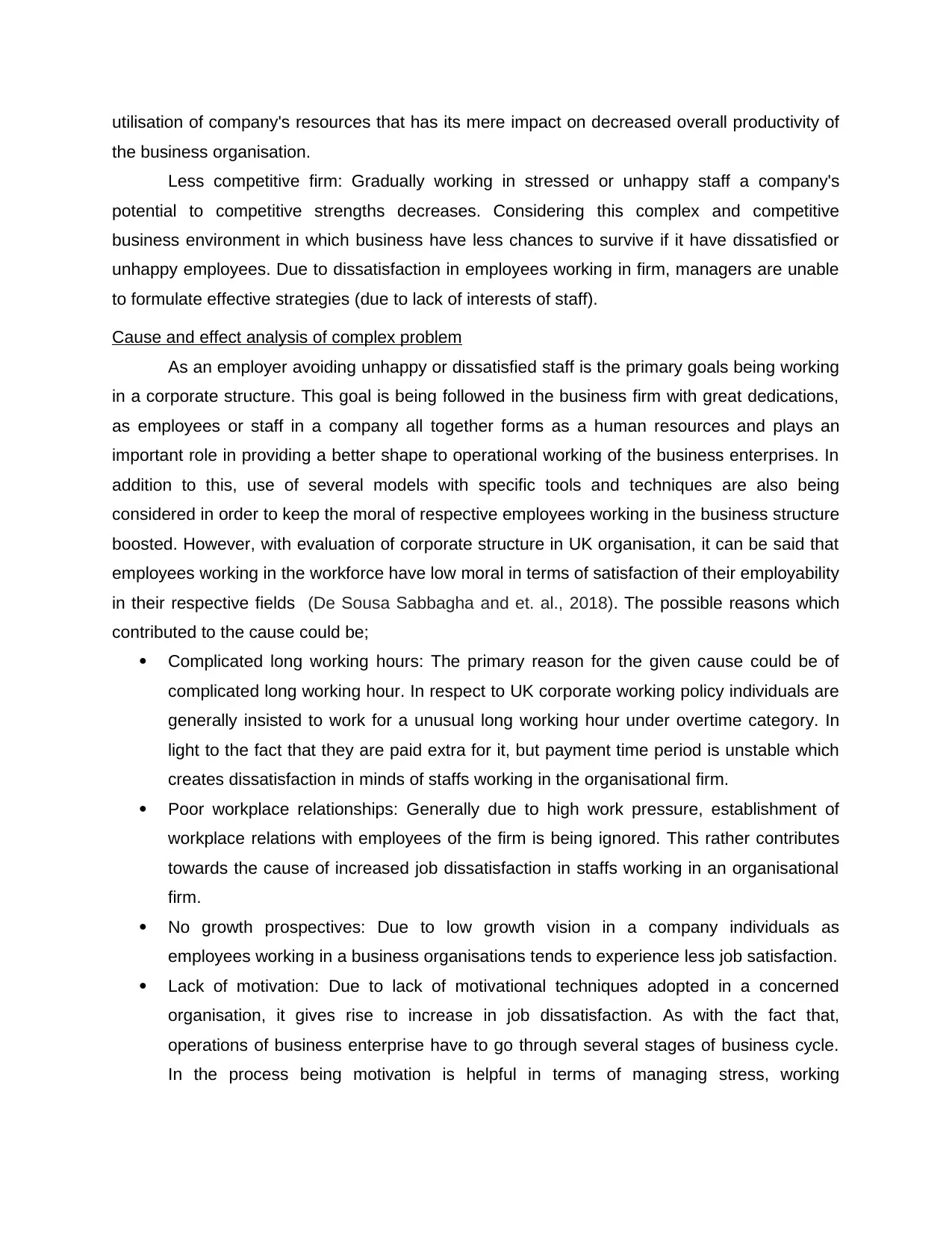
utilisation of company's resources that has its mere impact on decreased overall productivity of
the business organisation.
Less competitive firm: Gradually working in stressed or unhappy staff a company's
potential to competitive strengths decreases. Considering this complex and competitive
business environment in which business have less chances to survive if it have dissatisfied or
unhappy employees. Due to dissatisfaction in employees working in firm, managers are unable
to formulate effective strategies (due to lack of interests of staff).
Cause and effect analysis of complex problem
As an employer avoiding unhappy or dissatisfied staff is the primary goals being working
in a corporate structure. This goal is being followed in the business firm with great dedications,
as employees or staff in a company all together forms as a human resources and plays an
important role in providing a better shape to operational working of the business enterprises. In
addition to this, use of several models with specific tools and techniques are also being
considered in order to keep the moral of respective employees working in the business structure
boosted. However, with evaluation of corporate structure in UK organisation, it can be said that
employees working in the workforce have low moral in terms of satisfaction of their employability
in their respective fields (De Sousa Sabbagha and et. al., 2018). The possible reasons which
contributed to the cause could be;
Complicated long working hours: The primary reason for the given cause could be of
complicated long working hour. In respect to UK corporate working policy individuals are
generally insisted to work for a unusual long working hour under overtime category. In
light to the fact that they are paid extra for it, but payment time period is unstable which
creates dissatisfaction in minds of staffs working in the organisational firm.
Poor workplace relationships: Generally due to high work pressure, establishment of
workplace relations with employees of the firm is being ignored. This rather contributes
towards the cause of increased job dissatisfaction in staffs working in an organisational
firm.
No growth prospectives: Due to low growth vision in a company individuals as
employees working in a business organisations tends to experience less job satisfaction.
Lack of motivation: Due to lack of motivational techniques adopted in a concerned
organisation, it gives rise to increase in job dissatisfaction. As with the fact that,
operations of business enterprise have to go through several stages of business cycle.
In the process being motivation is helpful in terms of managing stress, working
the business organisation.
Less competitive firm: Gradually working in stressed or unhappy staff a company's
potential to competitive strengths decreases. Considering this complex and competitive
business environment in which business have less chances to survive if it have dissatisfied or
unhappy employees. Due to dissatisfaction in employees working in firm, managers are unable
to formulate effective strategies (due to lack of interests of staff).
Cause and effect analysis of complex problem
As an employer avoiding unhappy or dissatisfied staff is the primary goals being working
in a corporate structure. This goal is being followed in the business firm with great dedications,
as employees or staff in a company all together forms as a human resources and plays an
important role in providing a better shape to operational working of the business enterprises. In
addition to this, use of several models with specific tools and techniques are also being
considered in order to keep the moral of respective employees working in the business structure
boosted. However, with evaluation of corporate structure in UK organisation, it can be said that
employees working in the workforce have low moral in terms of satisfaction of their employability
in their respective fields (De Sousa Sabbagha and et. al., 2018). The possible reasons which
contributed to the cause could be;
Complicated long working hours: The primary reason for the given cause could be of
complicated long working hour. In respect to UK corporate working policy individuals are
generally insisted to work for a unusual long working hour under overtime category. In
light to the fact that they are paid extra for it, but payment time period is unstable which
creates dissatisfaction in minds of staffs working in the organisational firm.
Poor workplace relationships: Generally due to high work pressure, establishment of
workplace relations with employees of the firm is being ignored. This rather contributes
towards the cause of increased job dissatisfaction in staffs working in an organisational
firm.
No growth prospectives: Due to low growth vision in a company individuals as
employees working in a business organisations tends to experience less job satisfaction.
Lack of motivation: Due to lack of motivational techniques adopted in a concerned
organisation, it gives rise to increase in job dissatisfaction. As with the fact that,
operations of business enterprise have to go through several stages of business cycle.
In the process being motivation is helpful in terms of managing stress, working
Paraphrase This Document
Need a fresh take? Get an instant paraphrase of this document with our AI Paraphraser
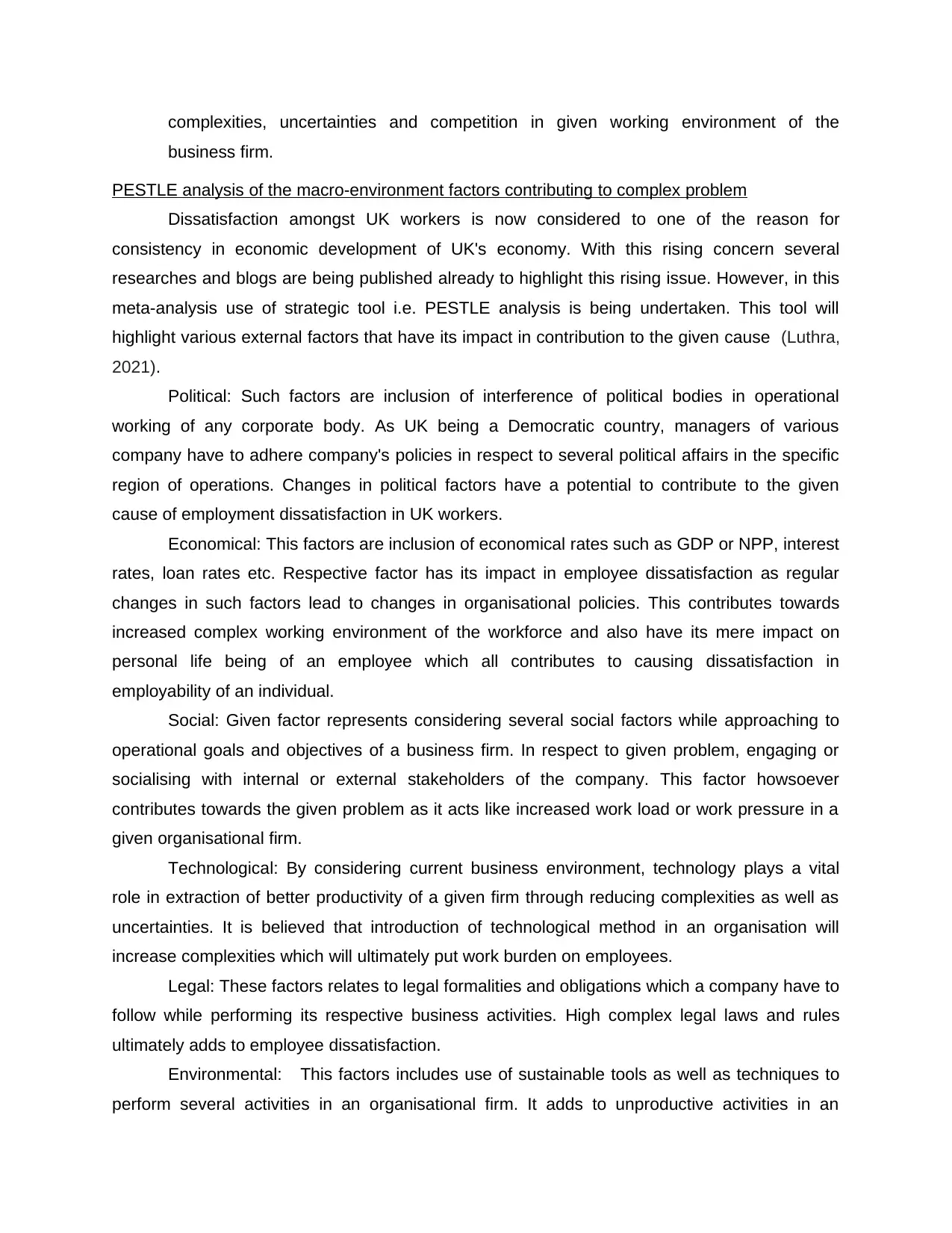
complexities, uncertainties and competition in given working environment of the
business firm.
PESTLE analysis of the macro-environment factors contributing to complex problem
Dissatisfaction amongst UK workers is now considered to one of the reason for
consistency in economic development of UK's economy. With this rising concern several
researches and blogs are being published already to highlight this rising issue. However, in this
meta-analysis use of strategic tool i.e. PESTLE analysis is being undertaken. This tool will
highlight various external factors that have its impact in contribution to the given cause (Luthra,
2021).
Political: Such factors are inclusion of interference of political bodies in operational
working of any corporate body. As UK being a Democratic country, managers of various
company have to adhere company's policies in respect to several political affairs in the specific
region of operations. Changes in political factors have a potential to contribute to the given
cause of employment dissatisfaction in UK workers.
Economical: This factors are inclusion of economical rates such as GDP or NPP, interest
rates, loan rates etc. Respective factor has its impact in employee dissatisfaction as regular
changes in such factors lead to changes in organisational policies. This contributes towards
increased complex working environment of the workforce and also have its mere impact on
personal life being of an employee which all contributes to causing dissatisfaction in
employability of an individual.
Social: Given factor represents considering several social factors while approaching to
operational goals and objectives of a business firm. In respect to given problem, engaging or
socialising with internal or external stakeholders of the company. This factor howsoever
contributes towards the given problem as it acts like increased work load or work pressure in a
given organisational firm.
Technological: By considering current business environment, technology plays a vital
role in extraction of better productivity of a given firm through reducing complexities as well as
uncertainties. It is believed that introduction of technological method in an organisation will
increase complexities which will ultimately put work burden on employees.
Legal: These factors relates to legal formalities and obligations which a company have to
follow while performing its respective business activities. High complex legal laws and rules
ultimately adds to employee dissatisfaction.
Environmental: This factors includes use of sustainable tools as well as techniques to
perform several activities in an organisational firm. It adds to unproductive activities in an
business firm.
PESTLE analysis of the macro-environment factors contributing to complex problem
Dissatisfaction amongst UK workers is now considered to one of the reason for
consistency in economic development of UK's economy. With this rising concern several
researches and blogs are being published already to highlight this rising issue. However, in this
meta-analysis use of strategic tool i.e. PESTLE analysis is being undertaken. This tool will
highlight various external factors that have its impact in contribution to the given cause (Luthra,
2021).
Political: Such factors are inclusion of interference of political bodies in operational
working of any corporate body. As UK being a Democratic country, managers of various
company have to adhere company's policies in respect to several political affairs in the specific
region of operations. Changes in political factors have a potential to contribute to the given
cause of employment dissatisfaction in UK workers.
Economical: This factors are inclusion of economical rates such as GDP or NPP, interest
rates, loan rates etc. Respective factor has its impact in employee dissatisfaction as regular
changes in such factors lead to changes in organisational policies. This contributes towards
increased complex working environment of the workforce and also have its mere impact on
personal life being of an employee which all contributes to causing dissatisfaction in
employability of an individual.
Social: Given factor represents considering several social factors while approaching to
operational goals and objectives of a business firm. In respect to given problem, engaging or
socialising with internal or external stakeholders of the company. This factor howsoever
contributes towards the given problem as it acts like increased work load or work pressure in a
given organisational firm.
Technological: By considering current business environment, technology plays a vital
role in extraction of better productivity of a given firm through reducing complexities as well as
uncertainties. It is believed that introduction of technological method in an organisation will
increase complexities which will ultimately put work burden on employees.
Legal: These factors relates to legal formalities and obligations which a company have to
follow while performing its respective business activities. High complex legal laws and rules
ultimately adds to employee dissatisfaction.
Environmental: This factors includes use of sustainable tools as well as techniques to
perform several activities in an organisational firm. It adds to unproductive activities in an
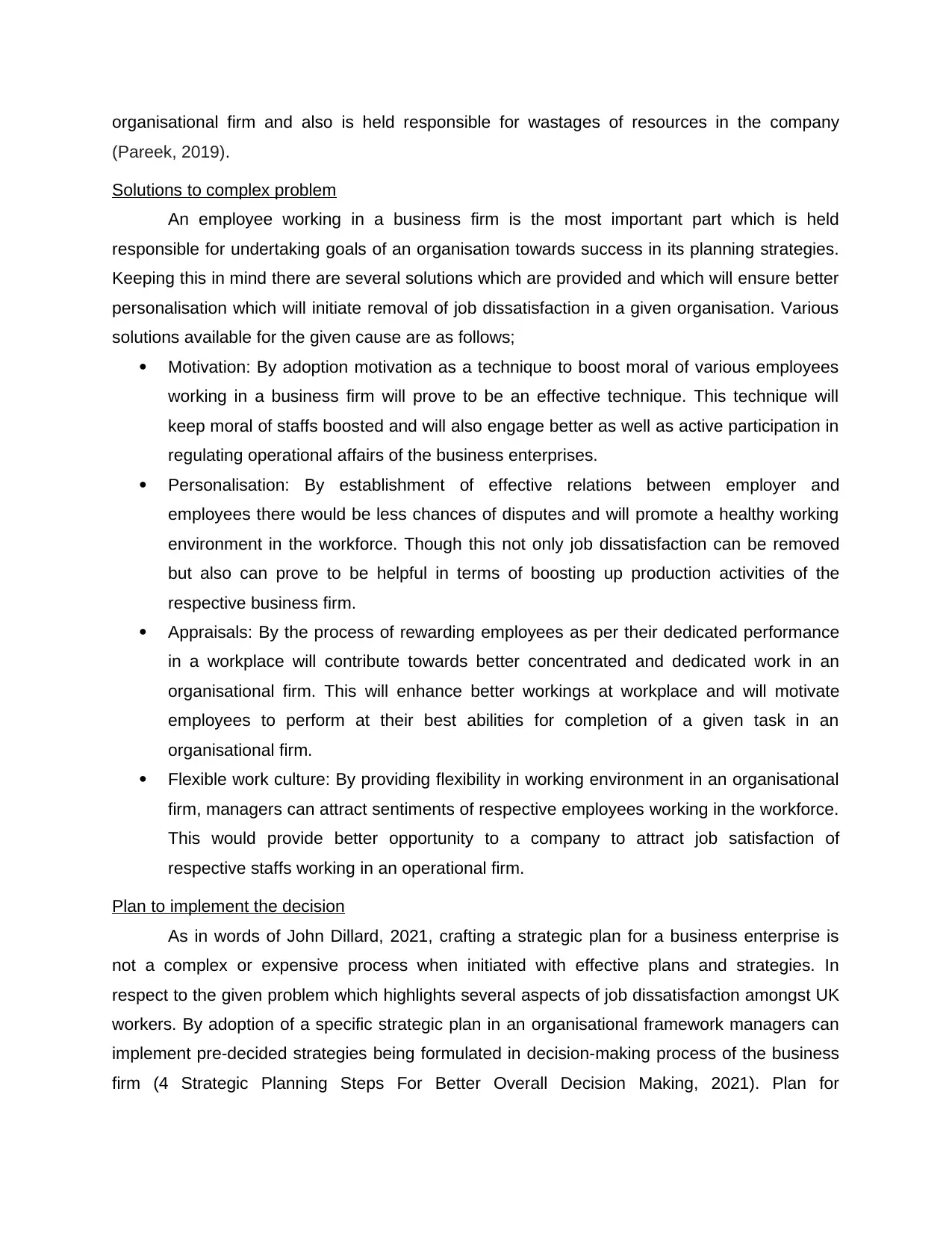
organisational firm and also is held responsible for wastages of resources in the company
(Pareek, 2019).
Solutions to complex problem
An employee working in a business firm is the most important part which is held
responsible for undertaking goals of an organisation towards success in its planning strategies.
Keeping this in mind there are several solutions which are provided and which will ensure better
personalisation which will initiate removal of job dissatisfaction in a given organisation. Various
solutions available for the given cause are as follows;
Motivation: By adoption motivation as a technique to boost moral of various employees
working in a business firm will prove to be an effective technique. This technique will
keep moral of staffs boosted and will also engage better as well as active participation in
regulating operational affairs of the business enterprises.
Personalisation: By establishment of effective relations between employer and
employees there would be less chances of disputes and will promote a healthy working
environment in the workforce. Though this not only job dissatisfaction can be removed
but also can prove to be helpful in terms of boosting up production activities of the
respective business firm.
Appraisals: By the process of rewarding employees as per their dedicated performance
in a workplace will contribute towards better concentrated and dedicated work in an
organisational firm. This will enhance better workings at workplace and will motivate
employees to perform at their best abilities for completion of a given task in an
organisational firm.
Flexible work culture: By providing flexibility in working environment in an organisational
firm, managers can attract sentiments of respective employees working in the workforce.
This would provide better opportunity to a company to attract job satisfaction of
respective staffs working in an operational firm.
Plan to implement the decision
As in words of John Dillard, 2021, crafting a strategic plan for a business enterprise is
not a complex or expensive process when initiated with effective plans and strategies. In
respect to the given problem which highlights several aspects of job dissatisfaction amongst UK
workers. By adoption of a specific strategic plan in an organisational framework managers can
implement pre-decided strategies being formulated in decision-making process of the business
firm (4 Strategic Planning Steps For Better Overall Decision Making, 2021). Plan for
(Pareek, 2019).
Solutions to complex problem
An employee working in a business firm is the most important part which is held
responsible for undertaking goals of an organisation towards success in its planning strategies.
Keeping this in mind there are several solutions which are provided and which will ensure better
personalisation which will initiate removal of job dissatisfaction in a given organisation. Various
solutions available for the given cause are as follows;
Motivation: By adoption motivation as a technique to boost moral of various employees
working in a business firm will prove to be an effective technique. This technique will
keep moral of staffs boosted and will also engage better as well as active participation in
regulating operational affairs of the business enterprises.
Personalisation: By establishment of effective relations between employer and
employees there would be less chances of disputes and will promote a healthy working
environment in the workforce. Though this not only job dissatisfaction can be removed
but also can prove to be helpful in terms of boosting up production activities of the
respective business firm.
Appraisals: By the process of rewarding employees as per their dedicated performance
in a workplace will contribute towards better concentrated and dedicated work in an
organisational firm. This will enhance better workings at workplace and will motivate
employees to perform at their best abilities for completion of a given task in an
organisational firm.
Flexible work culture: By providing flexibility in working environment in an organisational
firm, managers can attract sentiments of respective employees working in the workforce.
This would provide better opportunity to a company to attract job satisfaction of
respective staffs working in an operational firm.
Plan to implement the decision
As in words of John Dillard, 2021, crafting a strategic plan for a business enterprise is
not a complex or expensive process when initiated with effective plans and strategies. In
respect to the given problem which highlights several aspects of job dissatisfaction amongst UK
workers. By adoption of a specific strategic plan in an organisational framework managers can
implement pre-decided strategies being formulated in decision-making process of the business
firm (4 Strategic Planning Steps For Better Overall Decision Making, 2021). Plan for
⊘ This is a preview!⊘
Do you want full access?
Subscribe today to unlock all pages.

Trusted by 1+ million students worldwide
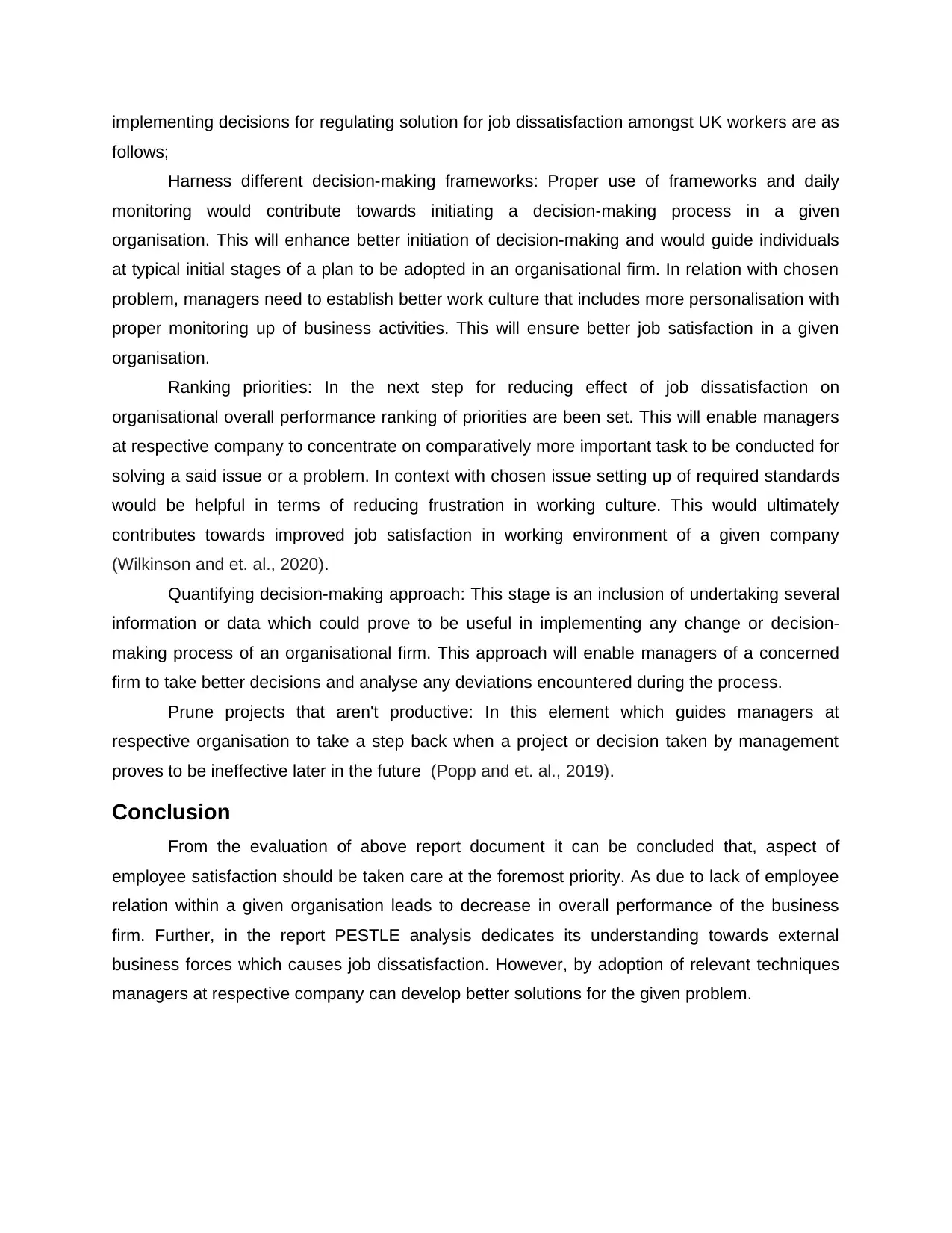
implementing decisions for regulating solution for job dissatisfaction amongst UK workers are as
follows;
Harness different decision-making frameworks: Proper use of frameworks and daily
monitoring would contribute towards initiating a decision-making process in a given
organisation. This will enhance better initiation of decision-making and would guide individuals
at typical initial stages of a plan to be adopted in an organisational firm. In relation with chosen
problem, managers need to establish better work culture that includes more personalisation with
proper monitoring up of business activities. This will ensure better job satisfaction in a given
organisation.
Ranking priorities: In the next step for reducing effect of job dissatisfaction on
organisational overall performance ranking of priorities are been set. This will enable managers
at respective company to concentrate on comparatively more important task to be conducted for
solving a said issue or a problem. In context with chosen issue setting up of required standards
would be helpful in terms of reducing frustration in working culture. This would ultimately
contributes towards improved job satisfaction in working environment of a given company
(Wilkinson and et. al., 2020).
Quantifying decision-making approach: This stage is an inclusion of undertaking several
information or data which could prove to be useful in implementing any change or decision-
making process of an organisational firm. This approach will enable managers of a concerned
firm to take better decisions and analyse any deviations encountered during the process.
Prune projects that aren't productive: In this element which guides managers at
respective organisation to take a step back when a project or decision taken by management
proves to be ineffective later in the future (Popp and et. al., 2019).
Conclusion
From the evaluation of above report document it can be concluded that, aspect of
employee satisfaction should be taken care at the foremost priority. As due to lack of employee
relation within a given organisation leads to decrease in overall performance of the business
firm. Further, in the report PESTLE analysis dedicates its understanding towards external
business forces which causes job dissatisfaction. However, by adoption of relevant techniques
managers at respective company can develop better solutions for the given problem.
follows;
Harness different decision-making frameworks: Proper use of frameworks and daily
monitoring would contribute towards initiating a decision-making process in a given
organisation. This will enhance better initiation of decision-making and would guide individuals
at typical initial stages of a plan to be adopted in an organisational firm. In relation with chosen
problem, managers need to establish better work culture that includes more personalisation with
proper monitoring up of business activities. This will ensure better job satisfaction in a given
organisation.
Ranking priorities: In the next step for reducing effect of job dissatisfaction on
organisational overall performance ranking of priorities are been set. This will enable managers
at respective company to concentrate on comparatively more important task to be conducted for
solving a said issue or a problem. In context with chosen issue setting up of required standards
would be helpful in terms of reducing frustration in working culture. This would ultimately
contributes towards improved job satisfaction in working environment of a given company
(Wilkinson and et. al., 2020).
Quantifying decision-making approach: This stage is an inclusion of undertaking several
information or data which could prove to be useful in implementing any change or decision-
making process of an organisational firm. This approach will enable managers of a concerned
firm to take better decisions and analyse any deviations encountered during the process.
Prune projects that aren't productive: In this element which guides managers at
respective organisation to take a step back when a project or decision taken by management
proves to be ineffective later in the future (Popp and et. al., 2019).
Conclusion
From the evaluation of above report document it can be concluded that, aspect of
employee satisfaction should be taken care at the foremost priority. As due to lack of employee
relation within a given organisation leads to decrease in overall performance of the business
firm. Further, in the report PESTLE analysis dedicates its understanding towards external
business forces which causes job dissatisfaction. However, by adoption of relevant techniques
managers at respective company can develop better solutions for the given problem.
Paraphrase This Document
Need a fresh take? Get an instant paraphrase of this document with our AI Paraphraser
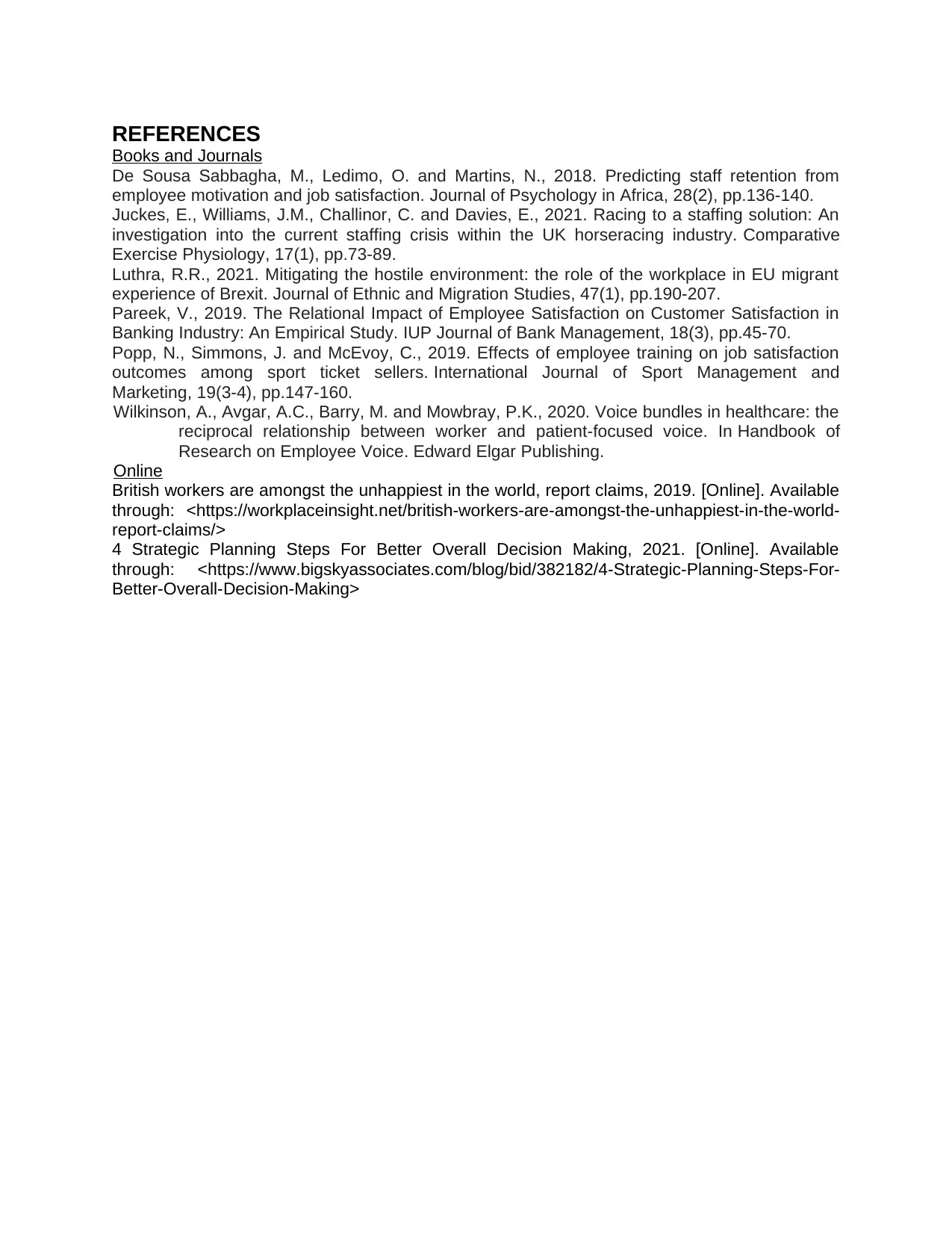
REFERENCES
Books and Journals
De Sousa Sabbagha, M., Ledimo, O. and Martins, N., 2018. Predicting staff retention from
employee motivation and job satisfaction. Journal of Psychology in Africa, 28(2), pp.136-140.
Juckes, E., Williams, J.M., Challinor, C. and Davies, E., 2021. Racing to a staffing solution: An
investigation into the current staffing crisis within the UK horseracing industry. Comparative
Exercise Physiology, 17(1), pp.73-89.
Luthra, R.R., 2021. Mitigating the hostile environment: the role of the workplace in EU migrant
experience of Brexit. Journal of Ethnic and Migration Studies, 47(1), pp.190-207.
Pareek, V., 2019. The Relational Impact of Employee Satisfaction on Customer Satisfaction in
Banking Industry: An Empirical Study. IUP Journal of Bank Management, 18(3), pp.45-70.
Popp, N., Simmons, J. and McEvoy, C., 2019. Effects of employee training on job satisfaction
outcomes among sport ticket sellers. International Journal of Sport Management and
Marketing, 19(3-4), pp.147-160.
Wilkinson, A., Avgar, A.C., Barry, M. and Mowbray, P.K., 2020. Voice bundles in healthcare: the
reciprocal relationship between worker and patient-focused voice. In Handbook of
Research on Employee Voice. Edward Elgar Publishing.
Online
British workers are amongst the unhappiest in the world, report claims, 2019. [Online]. Available
through: <https://workplaceinsight.net/british-workers-are-amongst-the-unhappiest-in-the-world-
report-claims/>
4 Strategic Planning Steps For Better Overall Decision Making, 2021. [Online]. Available
through: <https://www.bigskyassociates.com/blog/bid/382182/4-Strategic-Planning-Steps-For-
Better-Overall-Decision-Making>
Books and Journals
De Sousa Sabbagha, M., Ledimo, O. and Martins, N., 2018. Predicting staff retention from
employee motivation and job satisfaction. Journal of Psychology in Africa, 28(2), pp.136-140.
Juckes, E., Williams, J.M., Challinor, C. and Davies, E., 2021. Racing to a staffing solution: An
investigation into the current staffing crisis within the UK horseracing industry. Comparative
Exercise Physiology, 17(1), pp.73-89.
Luthra, R.R., 2021. Mitigating the hostile environment: the role of the workplace in EU migrant
experience of Brexit. Journal of Ethnic and Migration Studies, 47(1), pp.190-207.
Pareek, V., 2019. The Relational Impact of Employee Satisfaction on Customer Satisfaction in
Banking Industry: An Empirical Study. IUP Journal of Bank Management, 18(3), pp.45-70.
Popp, N., Simmons, J. and McEvoy, C., 2019. Effects of employee training on job satisfaction
outcomes among sport ticket sellers. International Journal of Sport Management and
Marketing, 19(3-4), pp.147-160.
Wilkinson, A., Avgar, A.C., Barry, M. and Mowbray, P.K., 2020. Voice bundles in healthcare: the
reciprocal relationship between worker and patient-focused voice. In Handbook of
Research on Employee Voice. Edward Elgar Publishing.
Online
British workers are amongst the unhappiest in the world, report claims, 2019. [Online]. Available
through: <https://workplaceinsight.net/british-workers-are-amongst-the-unhappiest-in-the-world-
report-claims/>
4 Strategic Planning Steps For Better Overall Decision Making, 2021. [Online]. Available
through: <https://www.bigskyassociates.com/blog/bid/382182/4-Strategic-Planning-Steps-For-
Better-Overall-Decision-Making>
1 out of 8
Related Documents
Your All-in-One AI-Powered Toolkit for Academic Success.
+13062052269
info@desklib.com
Available 24*7 on WhatsApp / Email
![[object Object]](/_next/static/media/star-bottom.7253800d.svg)
Unlock your academic potential
Copyright © 2020–2026 A2Z Services. All Rights Reserved. Developed and managed by ZUCOL.





